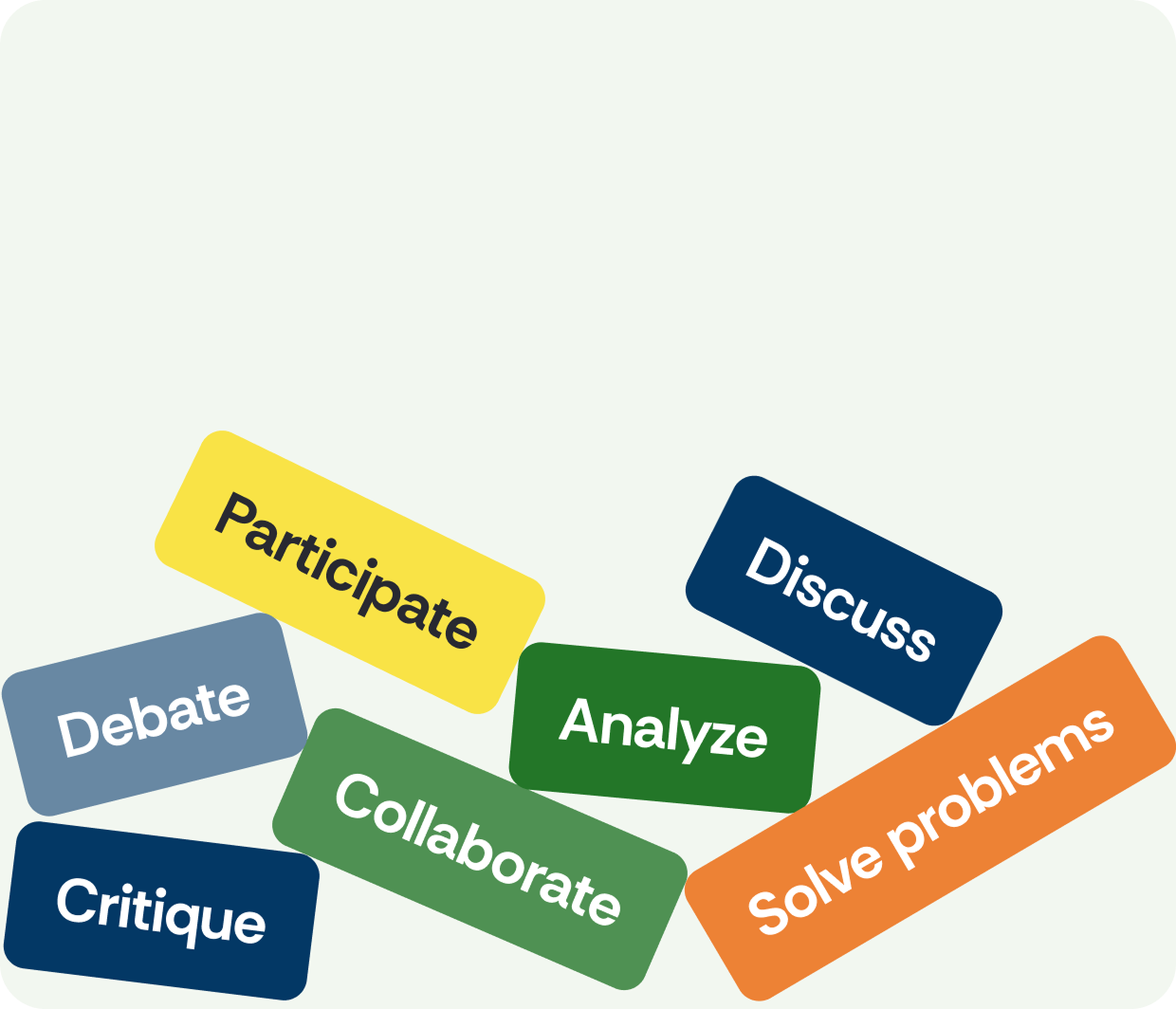Inquiry-Based Learning supported by FeedbackFruits
Inquiry-based learning turns curiosity into deep learning by enabling students to explore, innovate, and solve problems, fostering critical thinking, collaboration, and lifelong learning.

What is inquiry-based
learning?
Inquiry-based learning (IBL) is an active, student-centered approach in which learners ask questions, conduct investigations, and develop their understanding through exploration and problem-solving. This pedagogy shifts learning from passive memorization to active engagement, fostering critical thinking and analytical skills.

Why inquiry-based learning?
Inquiry-based learning encourages active engagement by allowing students to explore topics in-depth, fostering curiosity and independent thinking. This approach promotes critical thinking skills as students analyze, question, and solve real-world problems. By focusing on exploration and discovery, inquiry-based learning empowers students to become lifelong learners and adapt to new challenges.
Book a demoImproving retention and engagement
Combining inquiry-based learning (IBL) with teacher professional development and industry partnerships boosts student engagement across cognitive, affective, and operational domains.

Attard, et al. 2021
The Positive Influence of Inquiry-Based Learning Teacher Professional Learning and Industry Partnerships on Student Engagement With STEM
Developing critical thinking
Inquiry-based learning (IBL) engages students in hypothesis testing and data analysis, fostering critical thinking skills and a deeper understanding of the subject matter.

University of Miami
Inquiry-Based Learning Overview
Supporting collaboration
By immersing them in real-world scenarios, IBL enhances communication and cooperation while developing the ability to work effectively in group settings.

Queen's University
What is Inquiry-Based Learning?

How does FeedbackFruits inquiry-based learning?
FeedbackFruits significantly enhances inquiry-based learning by fostering an environment that encourages critical discussions, meaningful peer feedback, and seamless collaborative research.
To successfully implement IBL with FeedbackFruits, educators can start by guiding students in forming research questions and articulating their inquiries through Discussion on Work. This helps students build a solid foundation for their research journey.
Interactive Document further enriches the learning experience by enabling students to collaboratively annotate and critically analyze research materials, promoting deeper engagement and exploration. Peer Review also provides an opportunity for students to refine and elevate their findings through structured, constructive feedback.
Lastly, Group Member Evaluation plays a key role in cultivating accountability and effective teamwork, ensuring that students collaborate productively while developing essential research and communication skills.
To successfully implement IBL with FeedbackFruits, educators can start by guiding students in forming research questions and articulating their inquiries through Discussion on Work. This helps students build a solid foundation for their research journey.
Interactive Document further enriches the learning experience by enabling students to collaboratively annotate and critically analyze research materials, promoting deeper engagement and exploration. Peer Review also provides an opportunity for students to refine and elevate their findings through structured, constructive feedback.
Lastly, Group Member Evaluation plays a key role in cultivating accountability and effective teamwork, ensuring that students collaborate productively while developing essential research and communication skills.
Get started with inquiry-based learning using our pre-made learning templates
These templates—designed by experienced educators—offer proven structures for implementing inquiry-based learning. Simply select a template, customize it, and launch engaging activities in minutes.
Browse all templatesInquiry-based learning, directly within your LMS
FeedbackFruits integrates seamlessly with your Learning Management System, making it simple to incorporate inquiry-based learning activities into your existing courses. Whether you teach online, hybrid, or face-to-face, FeedbackFruits ensures that activating student participation is just a few clicks away—no additional overhead, no steep learning curve.





Explore our free resources about inquiry-based learning

Problem-solving at Deakin University
Dr. Tiffany Gunning and her team have been implementing a 2-year long project to prepare students for the world of work and encourage lifelong learning.
Read more
A guide to active learning: strategies and tools
Explore different strategies to critical discussions, meaningful peer feedback, and seamless collaborative research.
Read more
Making group work "work"
Learn how Yale University scaled group and peer-to-peer feedback opportunities to nurture meaningful discussions and problem-solving skills.
Read moreSee what FeedbackFruits learning activities can be used to support inquiry-based learning
Inquiry-based learning is hard. FeedbackFruits makes
it easier.
Unlock the full potential of inquiry-based learning and more with the Learning Design System.
Explore the Learning Design System










